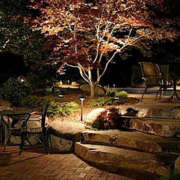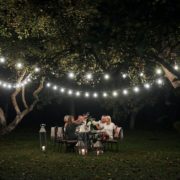Understanding Light Trespass Being a Good Neighbor
Understanding Light Trespass: What It Is and How to Be a Good Neighbor
As homeowners invest more in outdoor lighting to enhance their properties, it’s important to consider not only the aesthetics and safety benefits but also the potential impact on neighbors. One of the common issues that arise from outdoor lighting is light trespass. In this article, we’ll explore what light trespass is, its implications, and how you can be a good neighbor through responsible lighting practices.
What is Light Trespass?
Light trespass occurs when unwanted artificial light spills over from one property to another. This can happen due to poorly directed lighting fixtures, excessive brightness, or inappropriate placement of lights. Common examples include bright floodlights shining into a neighbor’s yard or overly bright landscape lights illuminating their windows at night.
Implications of Light Trespass
Light trespass can disrupt the quality of life for those affected. It may interfere with sleep, reduce privacy, and diminish the enjoyment of outdoor spaces. Beyond individual discomfort, excessive lighting can also negatively impact local wildlife, disrupting natural behaviors and ecosystems.
Solutions to Prevent Light Trespass
Fortunately, there are several strategies you can adopt to minimize light trespass while still enjoying the benefits of outdoor lighting.
1. Choose the Right Fixtures
Opt for lighting fixtures that are designed to minimize light spillage. Look for options with adjustable features that allow you to direct light exactly where it’s needed. Shielded fixtures can help prevent light from escaping into unwanted areas.
2. Use Motion Sensors
Incorporate motion-sensor lights to ensure that outdoor lighting is only activated when necessary. This can limit the time lights are on, reducing the likelihood of affecting your neighbors and conserving energy.
3. Adjust Brightness Levels
Consider using dimmable lights or lower-wattage bulbs to reduce brightness. This can help maintain a welcoming atmosphere without causing discomfort to nearby properties.
4. Strategic Placement
Carefully plan where you place your outdoor lights. Aim to position them away from property lines and direct them toward your own space. Consider the height of the fixtures; lights positioned lower to the ground typically produce less spillage.
5. Create a Lighting Plan
Before installation, develop a comprehensive lighting plan that outlines where and how you’ll use outdoor lighting. This helps ensure an even distribution of light while minimizing the potential for trespass.
6. Consult with Professionals
If you’re unsure about the best practices for outdoor lighting, consider consulting with a professional. Companies specializing in outdoor lighting can provide tailored advice and design solutions that enhance your property while being considerate of your neighbors.
Communicate with Your Neighbors
Maintaining open lines of communication with your neighbors is essential. If you’re planning to install new outdoor lighting, share your plans with them beforehand. This can help alleviate concerns and foster goodwill within your community.
When it comes to enhancing the beauty and security of our homes, we often overlook a crucial aspect: light trespass. This term refers to the unintended spread of light onto neighboring properties, which can result in formal complaints and strained relationships. It’s unsettling to think that our efforts to improve our own living spaces may unintentionally disrupt the peace and well-being of those around us.
Therefore, here are some tips for setting up outdoor lighting in a way that avoids causing distractions to your neighbors:
Placement
Where you place your lights is a crucial factor in preventing light trespass. Generally, it’s best to aim lights downwards and ensure they are pointed away from houses and windows. Use directional lighting fixtures that allow you to adjust the angle and distance of the light. This way, you can achieve the desired illumination without interfering with your neighbor’s privacy.
Brightness
Brightness is an important consideration when setting up outdoor lighting to avoid distracting your neighbors. Using overly bright lights can cause discomfort and glare, and even disturb the sleep of nearby residents. By choosing appropriate brightness levels, you can strike a balance between achieving your lighting goals and ensuring the comfort and well-being of your neighbors.
When deciding on brightness, consider the purpose of the lights. Suppose you’re using the lights for cosmetic purposes, such as highlighting architectural features or creating a pleasant ambiance, opting for modest. In that case, dimmer lights can create a gentle and inviting glow without causing unnecessary brightness or glare.
Timer or Motion Sensor
To avoid disturbing your neighbors, there are two practical options for your outdoor lights: using a timer or a motion sensor. By incorporating either of these solutions, you can establish specific times for the lights to be on or activate them only when someone is present, ensuring they aren’t needlessly illuminated all night long.
A timer enables you to automate the lighting schedule, guaranteeing that the lights are only on when necessary. On the other hand, motion sensors detect movement and activate the lights when someone enters the sensor’s range. This feature is particularly valuable for security lighting, as the lights will only illuminate when there is activity in the area, minimizing unnecessary illumination and disturbance for your neighbors.
Seasonal Lighting Set-up
For instance, some people hang up bright Christmas lights or turn on more in the summer when they want to party outside their homes. Although brief or irregular lighting is frequently tolerated better, some effects, like flashing Christmas lights, can be intrusive if they beam through someone’s window. It can be best only to use flashing and chasing impacts in the early evening, leaving the lights static for the remainder of the night.
Conclusion
By understanding light trespass and implementing thoughtful lighting solutions, you can enjoy a beautifully lit outdoor space while being a considerate neighbor. With a little planning and consideration, you can strike the perfect balance between illumination and respect for your community, ensuring everyone enjoys the beauty of the night.
Looking for exceptional outdoor lighting in Charlotte? Look no further than Charlotte Lighting & Hardscapes! Our team will visit your home and create a personalized outdoor lighting system that perfectly fits your needs. Our top-notch lighting systems are built to last, using only the highest quality materials for all fixtures and electrical components. Illuminate your outdoor space with us now!
read more at wiki














